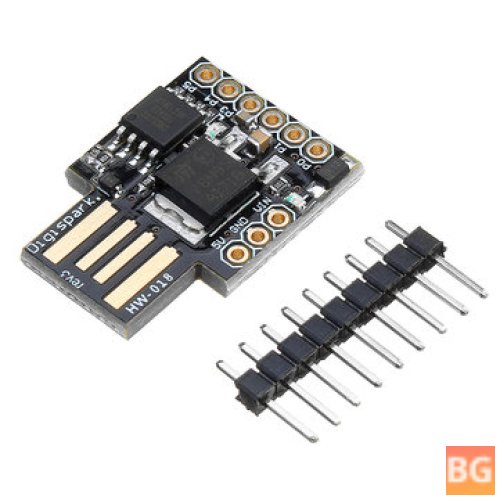The ATTINY85 Development Board is a reliable and versatile option for DIY electronics projects.
Its standout features include flexibility in power supply, compatibility with multiple operating systems, and built-in USB and serial debugging, making it easy to program and debug. The board has 6 I/O pins, enough for most projects, and an on-board 500ma 5V regulator ensures stable power supply, making it an excellent choice for small projects requiring low power consumption. The only downside is that some users may require technical knowledge to get started with driver installation, but once that is done, the board is straightforward to use. Overall, it is a cost-effective and functional microcontroller board worth considering.
Before we dive into the evaluation of the ATTINY85 Development Board let's take a quick overview of its features.
This development board supports the IDE 1.0+ (OSX / Win / Linux) and can be powered via USB or an external source of 5V or 7-35V (automatic selection). It also has a built-in USB and serial debugging and 6 I/O pins, where 2 are used for USB only if your program actively communicates over USB.
When put to the test the standout feature of this product is its flexibility in power supply and its compatibility with multiple operating systems. Its built-in USB and serial debugging make it easy to program and debug, while the 6 I/O pins provide enough functionality for most projects. The on-board 500ma 5V regulator ensures stable power supply, making it an excellent choice for small projects that require low power consumption. Overall, the ATTINY85 Development Board is a reliable and versatile option for DIY electronics projects.
The only real downside of this development board is that it requires some technical knowledge to get started as some users reported having difficulties with driver installation. However, once the drivers are installed, the board is straightforward to use. On the positive side, the board is compatible with multiple operating systems and has a flexible power supply that can be powered via USB or external sources of varying voltage levels. It also has a built-in USB and serial debugging making it easy to program and debug.
In conclusion the ATTINY85 Development Board is a strong contender in the market for micro USB development boards. Its flexibility in power supply, compatibility with multiple operating systems, and built-in USB and serial debugging make it a reliable and versatile option for DIY electronics projects. Without a doubt, this product should definitely be considered by anyone looking for a cost-effective and functional microcontroller board.
